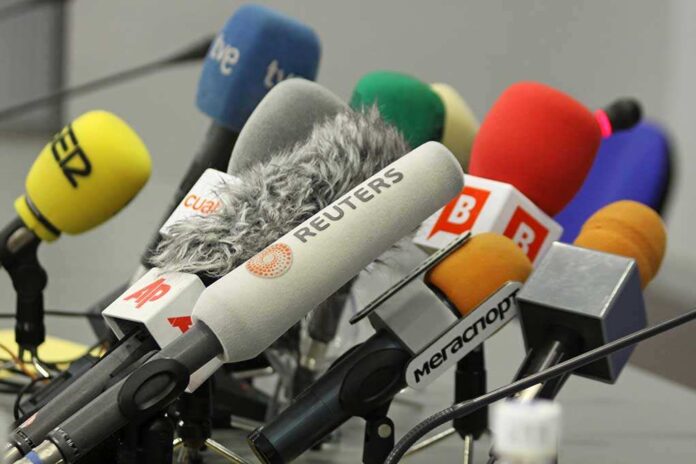
White House Press Secretary Karoline Leavitt’s fierce takedown of media “falsehoods” over Trump’s Russia-Ukraine negotiations exposes the latest front in the battle for America’s foreign policy narrative—and reveals just how high the stakes are for truth, sovereignty, and conservative values.
Story Snapshot
- Karoline Leavitt publicly accused media outlets of misrepresenting Trump’s peace negotiations with Russia, Ukraine, and European leaders.
- The administration denies making secret deals or concessions to Russia, asserting strong support for Ukrainian sovereignty.
- Vice President JD Vance praised Leavitt’s defense, calling for accurate, honest media coverage.
- Diplomatic talks continue, with skepticism from some European and Ukrainian leaders about US intentions and outcomes.
White House Fires Back Against Media Coverage of Negotiations
On August 19, 2025, Press Secretary Karoline Leavitt stood before the White House press corps and delivered a blistering rebuke of what she called “downright false” reporting on President Trump’s recent high-stakes meetings with Russian President Vladimir Putin, Ukrainian President Volodymyr Zelenskyy, and European leaders. Leavitt insisted that many media outlets distorted the administration’s diplomatic efforts and outcomes—particularly regarding allegations of secret concessions to Russia. Her remarks drew immediate praise from Vice President JD Vance, who emphasized the importance of truthful, responsible journalism, especially as the nation weighs the consequences of international negotiations that could shift the balance of power in Europe and test the integrity of US foreign policy.
Leavitt made clear that the Trump administration remains committed to Ukrainian sovereignty, denouncing any assertions of backroom deals or weakening American support for Ukraine’s independence. She directly refuted claims circulating in major outlets that the US had agreed to Russian demands behind closed doors, underscoring that negotiation does not mean capitulation. This public defense of the administration’s record reflects a broader strategy: reclaim the narrative from a media establishment often accused by conservatives of bias and misrepresentation, especially on issues central to national security, constitutional principles, and the limits of executive power.
Diplomacy Amid Distrust—What’s at Stake?
The backdrop to these developments is a tense series of talks: Trump met with Putin in Alaska on August 16 before hosting Zelenskyy and European leaders for two rounds of negotiations at the White House on August 18. Although Trump proposed a direct meeting between Zelenskyy and Putin to advance a peace deal, Russia declined, offering only senior officials for further talks and rejecting any NATO troop presence in Ukraine as part of security guarantees. The administration now faces a delicate balancing act—pushing for an agreement that protects American interests and Ukrainian sovereignty, while confronting skepticism from both allies and adversaries. For US conservatives, the risks are clear: any perceived concession to Russia could embolden adversaries, undermine American leadership, and erode confidence in the administration’s commitment to constitutional values and national security.
Negotiations remain ongoing and unresolved. European leaders, while participating in the talks, have voiced cautious optimism but warned against premature declarations of success. Ukrainian officials and commentators express concern that their interests could be sidelined in the pursuit of a quick diplomatic win. Meanwhile, the Trump administration considers additional sanctions and military aid to Ukraine, using these tools as leverage in a rapidly evolving geopolitical contest. The lack of a final agreement and the continued polarization of media coverage mean that Americans—especially those wary of globalist overreach and weak border policies—must scrutinize both the substance of these negotiations and the narratives being spun around them.
Media Scrutiny, Conservative Values, and the Fight for the Narrative
Leavitt’s aggressive posture against media “falsehoods” speaks directly to widespread frustration among conservatives over years of what they perceive as biased, agenda-driven reporting—reporting that has too often painted American strength, constitutional rights, and principled diplomacy as liabilities instead of assets. Her direct challenge signals a renewed commitment by the administration to defend not just its policies, but the core values of transparency, sovereignty, and limited government. As the Russia-Ukraine talks unfold, the administration’s willingness to call out media distortions underscores a broader determination to protect American interests—at home and abroad—from narratives that undermine the US Constitution, weaken allies, or embolden adversaries.
For conservatives, these events are a reminder that the fight for America’s future—whether on the world stage or in the information sphere—demands vigilance, skepticism toward unchecked media narratives, and a steadfast commitment to the values that have long defined the nation’s strength. As diplomatic efforts continue, the administration’s challenge is to maintain transparency and principle, ensuring that the interests of the American people and constitutional protections are never sacrificed for expediency or elite approval.
Sources:
Defense.gov: Trump, Zelenskyy, World Leaders Meet at White House to Negotiate Peace Deal
ABC News: Key takeaways from Trump and Zelenskyy’s Oval Office meeting to discuss Ukraine peace deal












